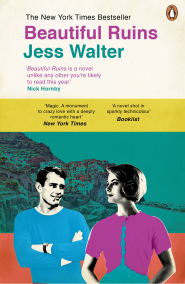When Italian fisherman and hopeful hotelier Pasquale meets American starlet Dee Moray, it's an encounter that he will never forget, even fifty years later. However, Pasquale already has one doomed love affair behind him, separated from his first love, Amedea, and from his son Bruce. In the present day, Claire Silver struggles with her role as a film development assistant, longing to be involved in the production of at least one movie she really believes in; will aspiring scriptwriter Shane's pitch about the controversial historical figure of William Eddy be the one? Meanwhile, her boss, Michael Deane, has written a failed memoir of his own. A few years earlier, musician and comedian Pat also struggles to restart his career by a last-ditch tour at the Edinburgh Festival, while around the time of Pasquale and Dee's first meeting, writer Alvis Bender reworks the single chapter of his novel that he has managed to produce over and over again. As this suggests, Jess Walter's sixth novel is a complex mess of sub-plots and separate threads, which weave only partially into a whole. But then I suspect that this is entirely what he intended for this novel, which spends so long dwelling on audience's expectations of Hollywood blockbusters. As Deane's editor puts it in his critique of the opening section of Deane's memoir, 'Look, it's your life and I'm not trying to put words in your mouth. But this story really needs closure.'
The title of this novel is one indication that readers are not going to receive the neat and perfect endings that they might want for any of these characters. Taken from a journalist's description of Richard Burton in 1980, Walter is explicit by the end of the novel that all his characters' lives are 'ruined'; none of them achieves exactly what they hoped for or escapes without making some compromises. To an extent, this can make Beautiful Ruins a frustrating read, especially when you feel you most strongly identify with the set of characters that the author appears to be least interested in. The fascinating essay by Walter that appears at the back of my copy of this book, 'In the Time of Galley Slaves,' certainly suggests that for Walter, it's all about Pasquale and Dee; it's their meeting that haunted him, and they are the two characters that forced him to keep on going with this book across its fifteen-year gestation period. Pasquale and Dee certainly stand at the heart of this novel, linking all the other threads together, although some are more tangential than others. However, the 'galley slaves' - as Walter refers to his characters - that really captivated me in Beautiful Ruins were those that had aspirations beyond the personal. The parallel stories of ruination traced across the lives of Alvis, Pat and Shane seemed to me to speak most interestingly about the questions raised by Walter's concept of lives as inevitable 'failures'. I also loved the way he incorporated the fragments of fiction into the mix - a technique reminiscent of Jennifer Egan's equally wide-ranging A Visit from the Goon Squad - and found myself drawn into Shane's pitch about the Donner Party and Alvis's first (or last) chapter of his war memoir. Ironically, I think it's these stories within a story that will stay with me longest.
All this is not to say that Walter's handling of Pasquale's and Dee's relationship is a failure. Indeed, he skilfully manages to avoid cliche, despite treading awfully close to it at time. Both characters are as realised and nuanced as the others in the novel. I guess what I resented slightly about the focus on this couple is that they were the only ones who really seemed to receive 'closure', despite Walter's swift whip-around of his characters' destinies in the final chapter of his novel. I wanted to know more about Claire, Shane, Pat and the rest, and less about the slightly-too-predictable ending to the central plotline. However, perhaps this is the point; in ruined lives, there cannot be an obvious ending, and the solid finale we get for Pasquale and Dee is a device to ensure that readers don't feel too cheated about the rest of the loose ends. In that case, I would have preferred their story to be incomplete, as well; but I understand that others may feel differently. At any rate, this is an engaging, gripping and reasonably ambitious novel that I would highly recommend.

No comments:
Post a Comment